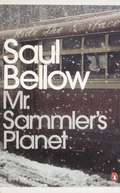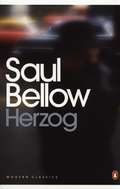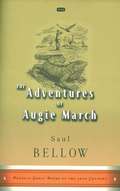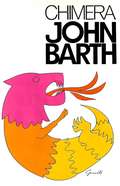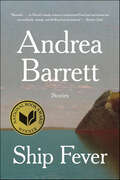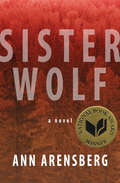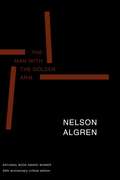Special Collections
National Book Award Winners - Fiction
- Table View
- List View
Mr. Sammler's Planet
by Saul BellowMr. Artur Sammler, Holocaust survivor, intellectual, and occasional lecturer at Columbia University in 1960s New York City, is a “registrar of madness,” a refined and civilized being caught among people crazy with the promises of the future (moon landings, endless possibilities). His Cyclopean gaze reflects on the degradations of city life while looking deep into the sufferings of the human soul. “Sorry for all and sore at heart,” he observes how greater luxury and leisure have only led to more human suffering. To Mr. Sammler—who by the end of this ferociously unsentimental novel has found the compassionate consciousness necessary to bridge the gap between himself and his fellow beings—a good life is one in which a person does what is “required of him.” To know and to meet the “terms of the contract” was as true a life as one could live. At its heart, this novel is quintessential Bellow: moral, urbane, sublimely humane.
Winner of the National Book Award
Herzog
by Saul BellowWinner of the National Book Award for Fiction, Herzog is the story of Moses Herzog, great sufferer, joker and moaner, cuckold, charmer, a man of our time.
The Adventures of Augie March
by Saul BellowOriginally published in 1953, Saul Bellow's modern picaresque tale grandly illustrates twentieth-century man's restless pursuit of an elusive meaning.
Augie March, a young man growing up in Chicago during the Great Depression, doesn't understand success on other people's terms.
Fleeing to Mexico in search of something to fill his restless soul and soothe his hunger for adventure, Augie latches on to a wild succession of occupations until his journey brings him full circle.
Yet beneath Augie's carefree nature lies a reflective person with a strong sense of responsibility to both himself and others, who in the end achieves a success of his own making.
A modern-day Columbus, Augie March is a man searching not for land but for self and soul and, ultimately, for his place in the world.
Winner of the National Book Award
[This text is listed as an example that meets Common Core Standards in English language arts in grades 11-12 at http://www.corestandards.org.]
Chimera
by John BarthChimera is a 310 page mythological fantasy novel written by the distinguished novelist and Humanities professor John Barth and first published in 1972. Random House provides the following illustration and analysis of the work's artistic tone and value:
"At this point I interrupted my sister as usual to say, 'You have a way with words, Scheherazade. This is the thousandth night I've sat at the foot of your bed while you and the King made love and you told him stories, and the one in progress holds me like a genie's gaze.'"
The speaker here is Dunyazade, kid sister of Scheherazade of The Thousand and One Nights, who has her own way with words. There is also Perseus, the demigod who slew the Gorgon Medusa, and yet finds himself at forty "sealeveled, parched and plucked, every grain in my molted sandals raising blisters, and beleaguered by the serpents of my past." And Bellerophon, the hero who tames the winged horse Pegasus only to discover, "My life's a failure. I'm not a mythic hero. I never will be." Like the Chimera of myth, which had a lion's head, a goat's body, and a serpent's tail, they are all joined into a single, dazzling whole that is, in a sense, the culmination of all of John Barth's work thus far, transforming myth into daily reality and vice versa.
"To the objection that classical mythology, like the Bible, is no longer a staple of the average reader's education and that, consequently, the old agonies of Oedipus or Antigone are without effect on contemporary sensibility, I reply, hum, I forget what, something about comedy and selfexplanatory context."
The reader needs no previous acquaintance with the characters to be caught up in this hilariously exuberant exploration of the nature of the hero, the multitudinous relationships between men and women, and the mortal search for immortality, which, it is persuasively suggested, may lie not in deeds but in words.
Winner of the National Book Award
Ship Fever
by Andrea Barrett1996 National Book Award Winner for Fiction. The elegant short fictions gathered hereabout the love of science and the science of love are often set against the backdrop of the nineteenth century. Interweaving historical and fictional characters, they encompass both past and present as they negotiate the complex territory of ambition, failure, achievement, and shattered dreams. In "Ship Fever," the title novella, a young Canadian doctor finds himself at the center of one of history's most tragic epidemics. In "The English Pupil," Linnaeus, in old age, watches as the world he organized within his head slowly drifts beyond his reach. And in "The Littoral Zone," two marine biologists wonder whether their life-altering affair finally was worth it. In the tradition of Alice Munro and William Trevor, these exquisitely rendered fictions encompass whole lives in a brief space. As they move between interior and exterior journeys, "science is transformed from hard and known fact into malleable, strange and thrilling fictional material" (Boston Globe).
Sister Wolf
by Ann ArensbergWinner of the National Book Award for Best First Novel: Ann Arensberg&’s celebrated work tells a hallucinatory tale of sexual desire, jealousy, and savage loveOn a June night in the Berkshire Hills of Massachusetts, Marit Deym prowls her land, anxiously awaiting the arrival of the van from the Dangerfield Zoo. When it finally comes—hours late—five wolves leap out onto the sprawling wildlife refuge Marit has created. And then one night, the wolves bring a stranger to her door.A poetry instructor at a school for the blind, Gabriel Frankman lives in self-imposed exile after the death of the girl he loved. He visits her grave every weekend. He carries sunflower seeds in his backpack and his friends are the birds. Meeting the girl who keeps wolves will transform Gabriel&’s life in ways he could never imagine.Haunting and lyrical, shot through with grace notes of passion and sorrow, Sister Wolf is about the power of human beings—like that of their animal brethren—to survive and endure.
The Man with the Golden Arm (50th Anniversary Edition)
by Nelson AlgrenThe Man with the Golden Arm is Nelson Algren's most powerful and enduring work. On the 50th anniversary of its publication in November 1949, for which Algren was honored with the first National Book Award (which he received from none other than Eleanor Roosevelt at a ceremony in March 1950), Seven Stories is proud to release the first critical edition of an Algren work.
A novel of rare genius, The Man with the Golden Arm describes the dissolution of a card-dealing WWII veteran named Frankie Machine, caught in the act of slowly cutting his own heart into wafer-thin slices. For Frankie, a murder committed may be the least of his problems. A literary tour de force, here is a novel unlike any other, one in which drug addiction, poverty, and human failure somehow suggest a defense of human dignity and a reason for hope.
Special contributions by Russell Banks, Bettina Drew, James R. Giles, Carlo Rotella, William Savage, Lee Stringer, Studs Terkel, Kurt Vonnegut, and others.
Winner of the first National Book Award
